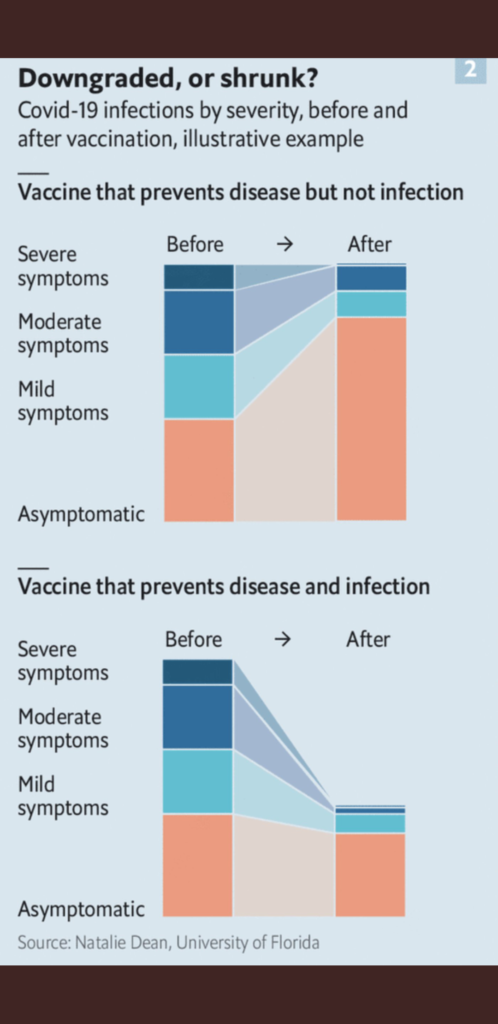Q: What is holding us back from knowing whether those who have been vaccinated can still be carriers of the virus and spread it to others?
A: COVID-19 vaccine trials were designed to measure how well they protect people from developing moderate to severe disease, not how well they prevent spread of the virus to others. However, preliminary evidence suggests that the vaccines available will reduce transmission from those vaccinated to others and more data should be coming soon!
What do we know right now?
*There is some preliminary evidence that vaccinated individuals are less likely to be infected period and/or have lower levels of virus circulating when they do get infected*
In the AstraZeneca trial, the overall reduction in positive tests among the vaccine group was ~50% indicating that individuals were either less likely to be infected at all or had levels of virus that were so low, they were not sufficient to test positive.
In a recent (not yet peer-reviewed) study in Israel, investigators compared levels of the virus in unvaccinated cases to that in cases who had received the first dose of the Pfizer vaccine. They found that the amount of the virus detected in vaccinated cases in the period 12-28 days after the first dose was administered was 4 times lower, compared to levels in those who weren’t vaccinated.
These studies indicate that vaccinated individuals may be less likely to get infected with SARS-CoV-2 at all and therefore spread the infection to others, or if they do get infected, may produce lower levels of virus, which could mean they will be less infectious and also less likely to spread the infection to others.
*There is also some preliminary evidence that vaccinated individuals are less likely to develop asymptomatic infection, which means this source of transmission would also be reduced.*
In the Moderna trial, they collected nasal swabs right before giving participants their second dose of the vaccine to identify those who became infected with SARS-CoV-2 after the first dose but were asymptomatic. They found that compared to the placebo group, 2/3rds fewer individuals tested positive for the virus at the second dose appointment in the vaccine group, suggesting some asymptomatic infections were prevented after the first dose.
In the AstraZeneca trial, in addition to testing those who presented with symptoms, U.K participants self-administered nose and throat swabs on a weekly basis, regardless of whether they had symptoms for the purpose of detecting asymptomatic infections (130 asymptomatic cases were detected more than 14 days after the second dose). Late-stage Phase III trial results indicate that there was a 49% reduction in asymptomatic infection, but only among those who inadvertently were given a lower first dose, instead of the standard dose. Effectiveness against asymptomatic infection was only 2.0% among those who received two full doses, however, and it is unclear why this was the case.
These studies indicate that vaccinated individuals may be less likely to develop asymptomatic infection which would reduce the amount of transmission that occurs from vaccinated individuals who don’t realize they are infected to others.
What do we still need to figure out?
While these preliminary studies give us reason for hope regarding reduced transmission from those who are vaccinated to others, we need more information on…
-the efficacy of various vaccines for preventing infection (and not just symptomatic disease),
-whether vaccinated individuals who become infected do tend to have lower levels of the virus and the extent to which viral load determines how infectious individuals are,
-the rate of transmission from those who are vaccinated to others which requires tracking whether cases are contacts of individuals who were vaccinated, and
-the extent to which vaccines prevent asymptomatic infection which requires testing of vaccinated individuals whether or not they have symptoms.
Luckily, more insight into these factors will likely emerge soon from ongoing trials and/or observations made in the general population as more people become vaccinated!
What happens, either way?
As illustrated beautifully by Nerdy Girl in Spirit, Dr. Natalie Dean (see graphic below), if the vaccines that are available or become available only prevent COVID-19 disease but not infection, the proportion of cases that result in mild to severe symptoms will be a much smaller, but the number of asymptomatic cases will likely increase. If available vaccines prevent both disease AND infection, then the absolute number of cases will shrink overall and the proportion of all cases that are moderate to severe will decrease to an even greater extent.
In other words, vaccines are good news for reduction of severe cases of COVID-19 either way. But, because we are still figuring out the extent to which vaccinated individuals get infected (regardless of whether they develop symptoms) and are subsequently able to transmit SARS-CoV-2 to others, continuing to use all your SMARTS (Space, Masks, Air, Restrict, Time and Shots), even if you’ve been vaccinated is advised to protect those around you who are not yet vaccinated.
A few recent articles summarizing what is currently known on this topic:
For our previous post on why those who are vaccinated need to continue to wear masks (for now), see here.



